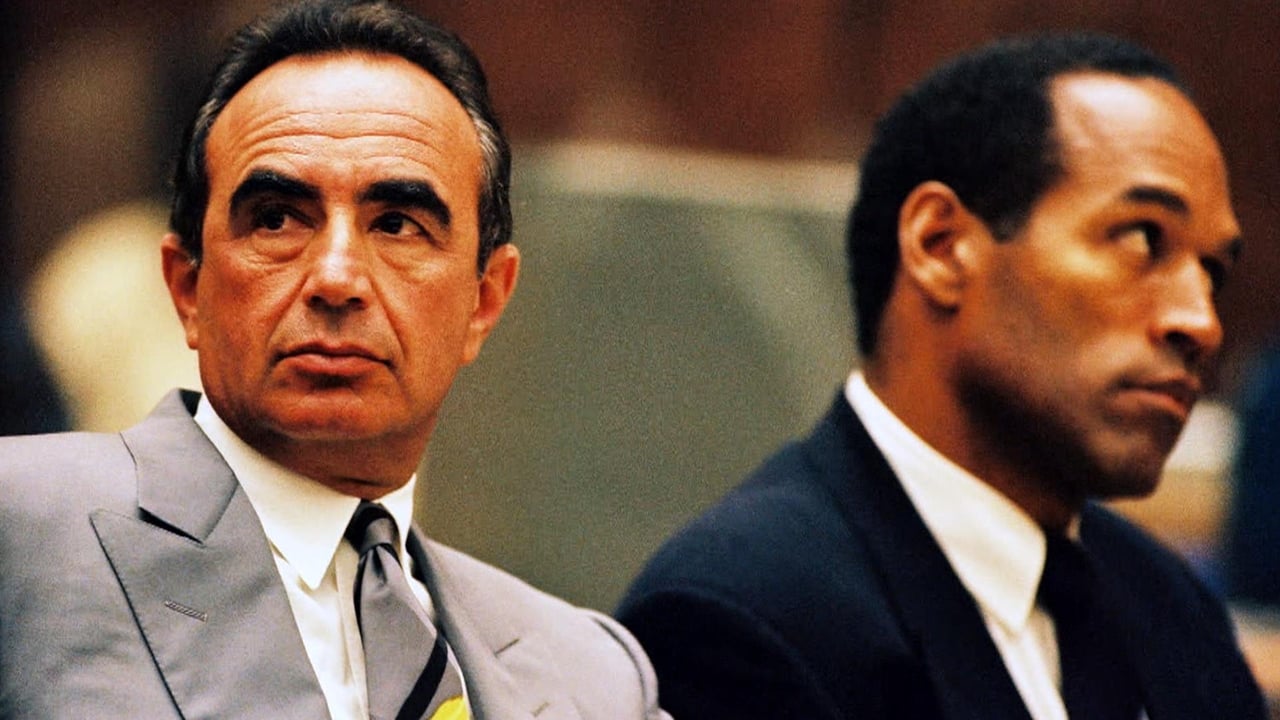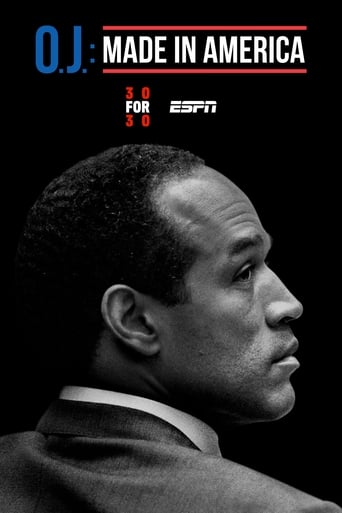

This guy is guilty as sin. He is nothing but an egotistical butt head. He killed Ron Goldman & Nicole with not remorse what so ever. He deserves to stay in jail in NV for the rest of his life. It will more than likely save another woman for another horrific death. When even some of the jurors stated that they voted not guilty because of revenge of Rodney King that was so wrong. Mark Furhman is also a butt head for his remarks, but that does not excuse OJ to get away with murder. When even his best friend & manager states he's guilty...that say something. I hope to God that all of the money from all of the shows that have been on lately, that the money will go to the Browns & Simpsons. Even his friend Kardashian look astonished with the not guilty verdict.
... View MoreA blistering and engrossing documentary about the O.J. Simpson murder trial that explores how the sensational event became a symbol for the racial tension that was just waiting to boil over in Los Angeles in particular and the United States in general.I was in college when the O.J. story happened, and I only half paid attention to it at the time, so it was fascinating for me to watch this film that seemed like a new version of an old story. The film makes no attempt to hide the filmmakers' opinion that the innocent verdict in the case was a gross miscarriage of justice, but I have to admit that, though I've always believed O.J. was guilty too, I would probably have acquitted him myself as a juror based on the dismal way the prosecution handled the case.But the grossest outrage about the whole event -- I felt it at the time and I felt it again watching the movie -- is that the murders that made the whole trial necessary in the first place were forgotten amid the racial baiting and the defense's willingness to capitalize on the emotions of an angry and disenfranchised black community. A seven-hour documentary may sound daunting at the beginning, but I challenge you not to binge watch it.Winner of the 2016 Oscar for Best Documentary Feature, a complete no brainer of a win.Grade: A
... View MoreI wanted to watch Made in America not because of what the show said about OJ, but for what it revealed about American society and how it's changed- or hasn't changed- since the early 1990s. Made in America tells several stories, beginning with the story of how OJ rose from his upbringing in public housing in San Francisco to become a sports star. I wasn't convinced by the show's portrayal of OJ as a legend beloved by the whole country. I was in primary school when he was making his name in football, and I wasn't a sports fan. I heard about the Juice from my older brother. In the early 70s though the big event for us was the Perfect Season Miami Dolphins. I spotted the name Mercury Morris in one of the newspaper articles shown on camera, and I hit pause so I could read it. While I grew up in Miami in the 70s and 80s the city had several riots sparked off by police officers being acquitted for shooting and killing African Americans. My parents lived in an affluent suburb and they didn't pay much attention to the race problems, except to advise me not to drive downtown when the problems were happening. I recognised the feelings of anger and frustration expressed by the African American community and the people interviewed for the film. I don't know if it was possible for OJ to have a fair trial. I sensed that LAPD and Los Angeles city officials were terrified that a guilty verdict would result in more riots and city wide destruction. While I was watching the footage in the episode about the verdict, I was struck that as the crowds in the streets shouted in joy when they heard OJ had been found not guilty the police horses whinnied in fright and the officers riding them struggled to keep them from bolting. I was shocked to learn that one of the jurors, who raised his hand in a Black Power salute, had been a member of the Black Panthers. Why didn't the prosecution ask for a mistrial? At any rate, OJ's expensive lawyers decided to play the race card from the start. I thought it was despicable, and Made in America's revealing that Simpson had distanced himself from the Civil Rights struggles made me feel it was even more despicable.Most of all OJ Made in America revealed the fascination that riveted the media in the US to the Simpson trial, and the fascination that the world media had as well. They weren't concerned so much about race-- the trial took place in Los Angeles, and discussed the racism of the LAPD, in the Rodney King case and many others, but above all it was all about Brentwood and Hollywood, celebrity, fame, and money. The People vs OJ Simpson showed that from the very beginning witnesses and people who claimed they they knew the truth were selling their stories to tabloid newspapers and trash TV shows. I wonder if Simpson would have had as much support from the public if he were rich- rich enough to hire big name attorneys- but not a celebrity.It was the slow chase down the LA freeways that grabbed everybody's attention- here was a celebrity who might blow his brains out on live TV, because he had killed two people - or maybe he was being set up by LAPD because he was black and the victims were white. It was a great show. I don't understand why the prosecution didn't ban cameras from the courtroom like the civil trial did, or why, if they wanted to use cameras, they didn't make them unobtrusive so the people in the courtroom couldn't see them. The trial became the media circus of the century. The last episode, with clips from Simpson's bizarre reality TV show, shows how celebrity and notoriety drive the consciousness of American life. It's significant that Simpson's ultimate downfall took place after an armed robbery to gain control over his memorabilia, which not only has great personal meaning to him, but is worth millions of dollars.I had to ask myself, why did I watch Made in America? I felt sorry for Nicole - she must have found it difficult to make a life for herself apart from OJ, who not only gave her fame and money, he supported most of her family. I felt sorry for Ron Goldman for being caught up in OJ's rage because he was seen a rival for Nicole's affections, and sorry for Ron's family who saw OJ walk free from a double homicide. I felt empathy for people who felt they had been denied the justice that was given to other Americans (I felt however that the film could have included how other people of other races have been treated by the white majority- there was nothing said about how the Hispanic community felt about how they were treated by the LAPD and the US government) Mostly I was appalled by how Simpson went back to a luxurious life after the trial, selling his autographs for 3 million dollars while in jail, and was still schmoozed by people who wanted a piece of his fame. It's telling that the Goldmans struck back with court orders grabbing Simpson's money, yet Simpson managed to make more sliding into sleaziness in South Miami Beach with coke addict blonde girlfriends. People wanted to keep watching him, keep collecting his signed footballs and t shirts, and keep trying to be associated with him. Made in America holds up a mirror and finds disturbing portraits: not just of OJ, and OJ's actions, but American society's obsession with wealth and fame.
... View MoreIt was well made, yes. Well acted? Yes. But it was no Doggy Daycare. Doggy Daycare just speaks so honestly to the audience, as if the gentle, caring puppies themselves were speaking through the miracle of HD Digital film. Six dogs sitting in chairs was a record and this was by far the picture of the year. www.StacksTV.xyz
... View More